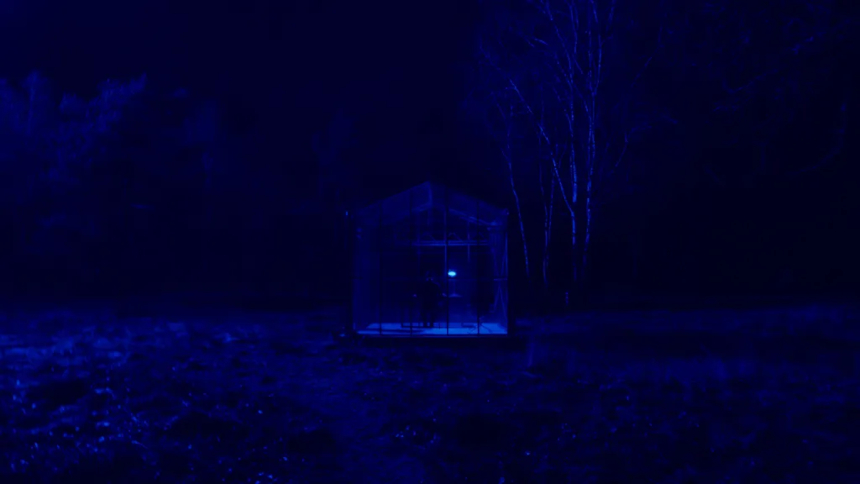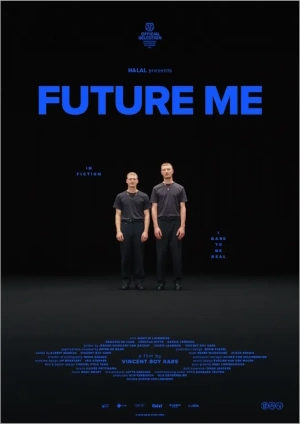Rotterdam 2024 Review: FUTURE ME Is Film As Therapy
Vincent Boy Kars' newest film is an interesting exposure of his own emotions.

Steven Spielberg once said, "I've avoided therapy because movies are my therapy." This has been turned into a famous meme where the quote is accompanied by the words, "Men will literally become the most famous film director in history instead of going to therapy". This meme applies to Vincent Boy Kars' Future Me, a film that is as brutally honest as a therapy session, but is also all about the avoidance of 'getting real'.
Vincent Boy Kars made two earlier films in which he blended reality and fiction, and explored the role of the director, the so-called 'Millennial trilogy'. In Independent Boy he took control of the life of a friend, thinking that he as a director might have some tools to cut through the malaise and rut his friend was stuck in. In Drama Girl (reviewed here) he explored the grieving process of his main actress through a series of reality-blurring exercises which became increasingly brutal and uncomfortable.
Now, in Future Me, he turns the lens on himself. Exploring the idea of fact and fiction again, by making a film about his own grieving process surrounding the death of his dad. He also tries to get out of a pattern where he avoids vulnerability and emotion, a 'boys don't cry'-narrative instilled by his perfectionist dad. One of the tools he uses is that actors, like famous Dutch actor Martijn Lakemijer, portray himself and the people in his life. Sometimes Lakemijer acts as his alter ego, other times Kars himself is asked to act out his memories or feelings among the rest of the cast portraying his family. Another director, called Peter, takes on the reins eventually, and proves himself to be a sometimes almost sardonic figure, who likes to really put Vincent emotionally through the wringer. What is real and what isn't becomes increasingly blurry.
 The blurring between fact and fiction feels at times painfully real, as if looking in on someone's therapy session. Like in a sex scene in which actor Martijn Lakijemer reenacts a moment in which Vincent had sex with his girlfriend, and became so controlling it feels like he is directing her in the moment. She rightfully calls him out for it, and she does as well later in the film, where Vincent seems to use the filmmaking process as an avoiding mechanism.
The blurring between fact and fiction feels at times painfully real, as if looking in on someone's therapy session. Like in a sex scene in which actor Martijn Lakijemer reenacts a moment in which Vincent had sex with his girlfriend, and became so controlling it feels like he is directing her in the moment. She rightfully calls him out for it, and she does as well later in the film, where Vincent seems to use the filmmaking process as an avoiding mechanism.
If this is a film about the sometimes narcissistic tendencies in millennials, and a boy in desperate need of therapy fleeing into fiction, the film itself might represent that flight in part. In fact, at times the film seems as cold and clinical as Vincent is afraid he might come across. Like watching a therapy session of someone else, at times it is uncomfortable, but at times we also lack the necessary context or attachment to the themes to really feel and understand his pain.
That might seem like I'm damning the film with faint praise, but the fact is that I left the screening before the Q and A started, for a positive reason. Not only because I ascribe to the theory that 'the author is dead' and a film should be able to stand on its own two legs, but also like I felt that the film left every card on the table. It's complete. The film is both distant and too close for comfort. Too opaque and too honest. It's this push and pull that makes it feel vibrant. It also made me ask some uncomfortable questions about myself and my relationships with people.
Sitting with the film, in silence, on my own, for an hour or two, and then writing this review, made me realize why Kars uses filmmaking as his therapy. Many of us nerds do, in some way, escape into fiction to not have to look too close in the mirror. By the end of the film Kars has fully exposed himself, emotionally. The idea that such a self-exploration might be called masturbatory isn't lost on Kars, as his alter ego jerks himself off in the shower during the opening credits.
But somewhere between the push and pull of the inner turmoil and the still surfaces, the emotional whirlpool becomes still water that runs deep. And somewhere on the flat surface of the water, the audience members might see themselves reflected, uncomfortably so. What I am saying is that Vincent fleeing therapy by making fiction, itself becomes therapeutic. I might have started this review with the Spielberg-meme, but Future Me proves all of us might benefit from a little therapy. And a bit of film.
Future Me
Director(s)
- Vincent Boy Kars
Writer(s)
- Vincent Boy Kars
- Jolein Laarman
- Jeroen Scholten van Aschat
Cast
- Damaris de Jong
- Martijn Lakemeier
- Saskia Temmink







